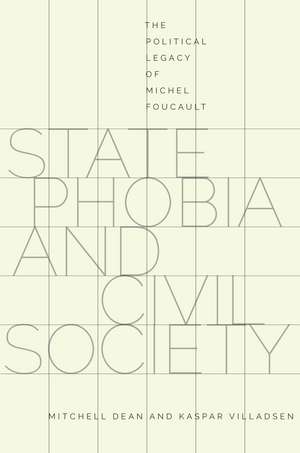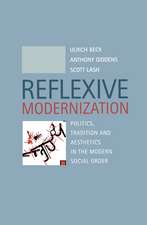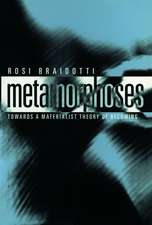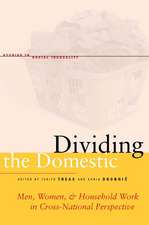State Phobia and Civil Society: The Political Legacy of Michel Foucault
Autor Mitchell Dean, Kaspar Villadsen, Dean Mitchellen Limba Engleză Paperback – 5 ian 2016
| Toate formatele și edițiile | Preț | Express |
|---|---|---|
| Paperback (1) | 157.29 lei 22-36 zile | |
| Stanford University Press – 5 ian 2016 | 157.29 lei 22-36 zile | |
| Hardback (1) | 613.71 lei 43-57 zile | |
| Stanford University Press – 5 ian 2016 | 613.71 lei 43-57 zile |
Preț: 157.29 lei
Nou
30.10€ • 31.24$ • 25.16£
Carte disponibilă
Livrare economică 24 februarie-10 martie
Specificații
ISBN-10: 0804796971
Pagini: 208
Dimensiuni: 152 x 229 x 18 mm
Greutate: 0.3 kg
Editura: Stanford University Press
Colecția Stanford University Press
Recenzii
Notă biografică
Descriere
Cuprins
The Introduction argues for the importance of addressing the theme of state and civil society in the present situation. It describes this situation as one in which anti-statist or even state-phobic tendencies are evident in a wide spectrum of academic and political thought, and in literatures concerning the reorganization of public governance. It introduces the examination of Foucault's evolving stances on this theme and asserts the necessity of placing them in their historical and political contexts, particularly in regard to his diagnostics of the present. It also gives an overview of the chapters.
This chapter examines the interpretation of Foucault as rejecting the language of state and civil society in his search for a new analysis and diagnosis of power. It locates his political thought in its own context, including the decline of Marxism as theoretical and practical framework, and sketches both the context of its reception in English-speaking countries at the end of the twentieth century and also of our present. It introduces the nature of his governmentality lectures and his analysis of liberalism and neoliberalism, discusses their comments on the fascist state, and reflects upon the meaning of his key term, state phobia.
This chapter undertakes a critical examination of Michal Hardt and Antony Negri's influential work, partially inspired by Foucault. Focusing on their trilogy concerning Empire and the multitude, the chapter shows that this work contains acute observations on globalized capitalism in a time where modern assumptions are questioned. It also shows how Hardt and Negri, in their grand diagnosis, occlude the nation state completely and render the non-state and non-institutional forces of the multitude as a kind of hyper civil society.
This chapter examines the work of another influential inheritor of Foucault, Nikolas Rose, and his approach to contemporary politics. Although Rose's "humble" empiricism presents itself in opposition to the metanarratives of the like of Hardt and Negri, there are some striking similarities. There is a common fascination with the domain of the "bio" and a politics of life, a belief in relatively unorganized sources of political action from the grassroots and at the margins and interstices, and a shared anti-state and anti-institutional position. Rose has produced rich empirical work, yet the chapter argues that his "ethico-politics" (and later, "ethopolitics") of creative self-fashioning within "communities" is unable to address fundamental political questions and resembles a sociological life politics grounded in a form of vitalism.
This chapter asks: was a Foucault a defender of community, differences and political movements in civil society? It examines Foucault's enthusiasm for grassroots, localized activism and bottom up politics. Particular attention is given to his engagement with political militancy in the early 1970s in the prisoners' support group, Group d'information sur les prisons (GIP). Some explanations are given for Foucault's activities and links are established between his political practices and his intellectual development. An excursus counterbalances Foucault's apparent pro-civil society stance with evidence of a much more skeptical view of the forces at the micro-level of society, including practices of denunciation and social exclusion among 'small people'.
This chapter examines Foucault's approach to key conventional political questions such as constitutionalism, state universality and political identity. The context is Foucault's 1976 lecture series, "Society Must Be Defended", where he dissolves the state into a multiplicity of political forces hereby showing that the universality of the state rests upon silenced battles. The lectures foreground writers on "race war," who render the social body as a battlefield between antagonistic groups and resonate with neo-Marxist literature on "hegemony." The chapter discusses whether Foucault's Nietzschean reading of state universality forecloses any recognition of the state as a mediator of social conflict and confessional war.
Foucault famously wished to "cut off the King's head in political theory" and to produce an analysis outside the juridical-political framework of sovereignty. This chapter explores his most sophisticated attempt to do so, namely his work on the dispositifs. In the 1978 lectures, Security, Territory, Population, Foucault performs what one may term a decentering of the state into divergent technical assemblages, or the dispositfs of law, discipline and security. The concept was reassessed by Deleuze, who gave it a neo-vitalist cast, and enthusiastically rediscovered by later followers. While the concept opens up a fine-grained analysis of governmental technologies and their dynamic interplay, the chapter questions whether it can replace the analysis of the history of the state as both concept and institution.
This chapter extends and deepens the assessment of the dispositif, including its implications for political analysis. It demonstrates that the complexity of this framework is not simply due to the existence of several dispostifs and their interplay. Each dispositif is kept in motion by inherent contradictions and paradoxes, principally the tension between diagrams and institutions. Diagrams are pure schematics, unattainable ideals, around which governmental practices revolve. They represent a virtuality that both animates and threatens the social order. The chapter explores the diagram's analytical potentials with regard to current political issues but also gives emphasis to the blind spots and foreclosed alleys of this immanentist analysis.
This chapter examines Foucault's account of the emergence of the notion of civil society as a counterpart to a liberal art of governing from the end of the eighteenth century in relation juridical and political rights and homo oeconomicus. While the general framework offered by Foucault is a secularizing one of the becoming-immanent of governmental rationality, his account cannot quite escape theological elements. His reflections on political eschatology are introduced in relation to the idea of civil society.
This chapter continues exploring Foucault's ambivalence with regard to theology in his narrative of the movement from transcendent to immanent forms of power and government. It situates him firstly in relationship to the debate on secularization between Karl Löwith, Hans Blumenberg and Carl Schmitt, and discovers an institutional political theology of the pastorate. It then locates in relation to what Giorgio Agamben calls economic theology and finds a hitherto unnoticed convergence between Foucault's genealogy of governmentality and the political eschatology of the twelfth century monk, Joachim di Fiore.
This chapter explores Foucault's relation to neoliberalism. It places his thought on it in relation to other perspectives, including that of an organized "thought collective", which has had considerable influence and impact on governments and international organizations in the last half-century. Using the case and testimony of his closest follower, François Ewald, it interrogates Foucault's relationship by the end of the 1979 lecture series, Birth of Biopolitics, and in his engagement with the Second Left. The analysis departs from the simple view that Foucault was an early critic of neoliberalism.
The conclusion summarizes and synthesizes the book's main discoveries and claims. It argues that Foucault's political legacy still holds a wide range of potentials for analyzing contemporary political issues and local insights into public policies and the transformation of regimes of governing. Nevertheless, there is an "immanentist" and anti-state trajectory that one can follow in his political thought. The conclusion summarizes Foucault's three de-centerings of the state into battle, administrative technologies, and liberal arts of government. While he ultimately refuses a political position, there are affinities between his work and anti-statism from Maoism to neoliberalism. This is one that limits analytical and critical possibilities in the current context in which issues of poverty, inequality and debt are once more at the fore. The conclusion sketches alternative ways of thinking about law, sovereignty and the state.












